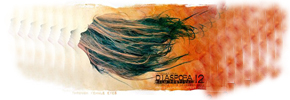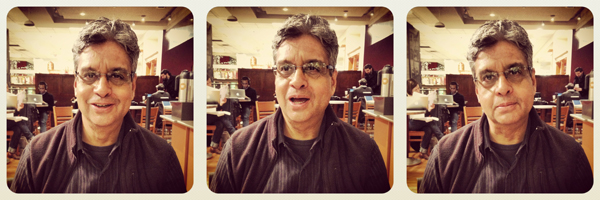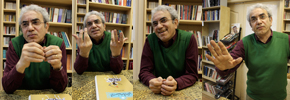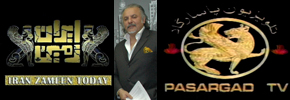Sima Sahar Zerehi – “My fist exposure to the festival was walking into Innis Town Hall and seeing a poster for the Diaspora Film Festival on the door. I looked at the lineup and I was amazed at how great these films were and I had never heard of this festival before,” recounts Paul de Silva the Co-director of the International Diaspora Film Festival about his first encounter with IDFF five years ago.
IDFF, which is now in its 12th year, started as a humble festival that attracted a niche following of loyal film buffs. The project was a labour of love initiated by Shahram Tabe who shrewdly noticed that a metropolis such as Toronto, with a diverse population of immigrants from various parts of the world was an ideal locale for a film festival with a focus on the experiences of diasporic communities.
I remember being among a handful of people at University of Toronto’s Innis Town Hall in one of the festival’s first years. At that time, the festival was more akin to a film club. The attendees were so few in number that it was inevitable that after a few screenings we were on a first-name basis. We would use the breaks between films to share a cup of coffee and debate the merits of the films. There was a real sense of community to the experience.
It’s hard to imagine that an event with such humble beginnings has now grown into one of Toronto’s emerging arts festivals.
The annual festival, which takes place over five days from November 1 to November 6, is an opportunity to showcase the works of established as well as emerging film makers from all over the world who explore the themes of migration, immigration, and cultural diversity. While IDFF strives to shine a light on the works of emerging Canadian filmmakers from ethnic communities, it also attracts some of Canada’s elite filmmakers including Deepa Mehta and Atom Egoyan.
De Silva, who teaches at Ryerson’s School of Image Arts, admits that he was immediately drawn to IDFF, “I’ve always been interested in cultural stories.” He adds that the festival’s focus on the diaspora was a real draw for him, “The films are quite focused on stories by and about filmmakers and issues dealing with diasporic communities across the world. As an immigrant myself I was very interested in exploring these themes of exile, migration, adjustment, blending of culture, racism, gender and class.”
The theme for the festival this year is “Through Female Eyes” featuring films made by or about women in the diaspora. Films such as Umut Dağ’s Kuma about two women from a Turkish community in Vienna dealing with the unexpected death of their husband, Tony Gatlif’s Indignados a docudrama about an illegal immigrant woman from North Africa and Cyrus Sundar Singh’s Mashala about a Toronto musician who moves to Spain and discovers her Jewish roots through Sephardic music are some of the festival’s highlights.
De Silva explains why there’s a need for festivals such as IDFF, “so many of these films would never get seen if it wasn’t for festivals like ours.” He adds, “the sad and shocking part of it is that many of these wonderful films never see the light of a cinema projector more than once because of the level of competition from the global machine of the commercial film industry.”
In addition to offering film lovers an opportunity to see works rarely available on the big screen, the festival also provides access to audiences to meet some of cinema’s innovators. This year one of IDFF’s guests will be Elie Wajeman the director of Aliyah, a Cannes 2012 winner. His award-winning film tells the story of a young French Jew caught between family ties and dreams of moving to a better life in Israel.
The festival also provides opportunities for serious film scholars to learn about the history of film. This year IDFF will feature a screening of Khaz-Push a Soviet/Iranian film made in 1928. The film is about the suppressed revolt of Iranian peasants and craftsman, the Khaz-push people. Sergei Kapterev, a Senior Researcher at the Research Institute of Cinema Art in Moscow, will follow the screening with a talk.
Canadian film aficionados can look forward to the screening of the Classic Canadian flick Calendar (۱۹۹۳) by Atom Egoyan, about a photographer who travels across Armenia to take photos of Armenian churches for a calendar. A Q&A with Egoyan will follow the film.
I ask de Silva to pick his top three film choices from this year’s IDFF lineup.
“Shanghai Gypsy (۲۰۱۲) by Marko Naberšnik, is one of my top choices, it’s a Slovania feel-good epic family story with an incredible multi-ethnic, multicultural cast from the region,” explains de Silva. The film was the winner of Best Screenplay in the Montreal Film Festival in 2012; this will be its Toronto Premiere.
For his second pick de Silva names Craig Freimond’s Material (۲۰۱۲) a South African comedy about a young man from a traditional Muslim family who wants to be a comedian despite his father’s wishes for him to continue the family fabric shop.
“The film has universal themes of a father who wants his son to follow in his footsteps, it’s also a love story and a tale about intergenerational conflict, most interestingly it shows a portrait of a diasporic community that we seldom have a chance to see on screen, the Muslims in South Africa,” explains de Silva.
Material was as an Official Selection in the London Film Festival (2012), the Busan Film Festival (2012) and the Montreal Film Festival (2012), this is the film’s Toronto Premiere.
For his third choice de Silva selects Safinez Bousbia’s documentary El Gusto (۲۰۱۱, Ireland/Algeria). The doc chronicles the story of the filmmaker’s quest to reunite a group of musicians in Algiers who performed Chaabi, a genre of popular Algerian music that blends Berber melodies, religious chants and Andalusian tunes. The documentary is the Winner of the Arab-World Documentary’s Prize at the Abu Dhabi Film Festival (2012). This film will have its Canadian Premiere on the opening night of IDFF.
For those interested in films with an Iranian connection de Silva recommends:
Hatred By Reza Dormishian (Iran, 2012) about two young Iranians whose families leave Iran with hopes of a peaceful life in Turkey.
“Hatred is shot like a French new wave film, the style makes it stand apart from the typical film from Iran featured at most film festivals,” states de Silva.
Keys to My Home, a documentary by Luna Shad is de Silva’s second choice for those interested in Iran. The film features an Iranian refugee journalist speaking about the killing of Neda Agha-Soltan during the Green Movement uprising.
Although IDFF has come a long way, de Silva and Tabe aspire to grow the festival even more in the future.
“Our long-term goal is to take it online with a combination of free and pay-per-view options,” explains de Silva. “We want to not only provide access to the films for people all over the world but also some type of monetization for the filmmakers to get some return so they can invest in other films.”
“The hope is to provide quality alternatives to what is commercially available online,” concludes de Silva.
______________________________________________________________
For more information and film schedules for The International Diaspora Film Festival visit www.diasporafilmfest.com






